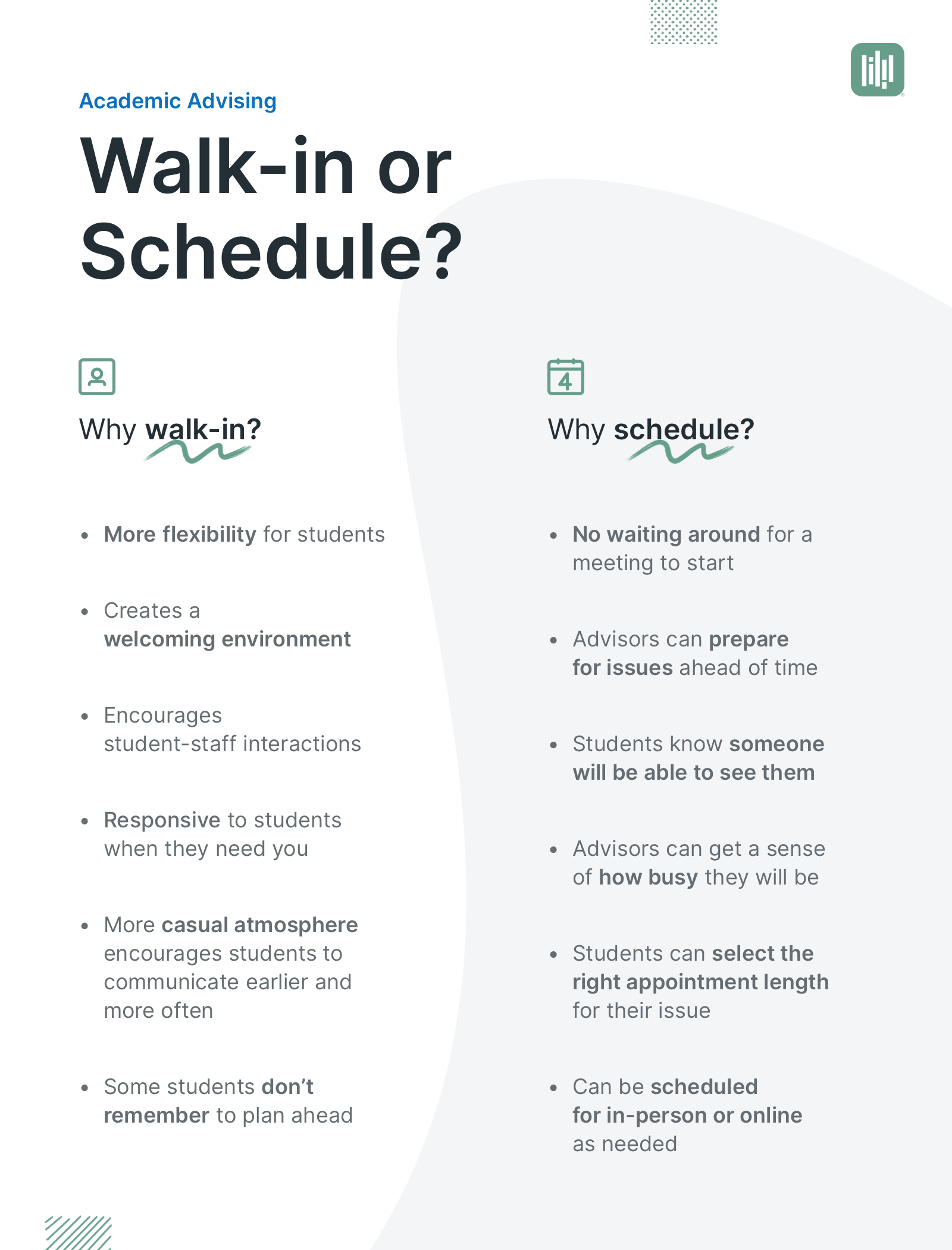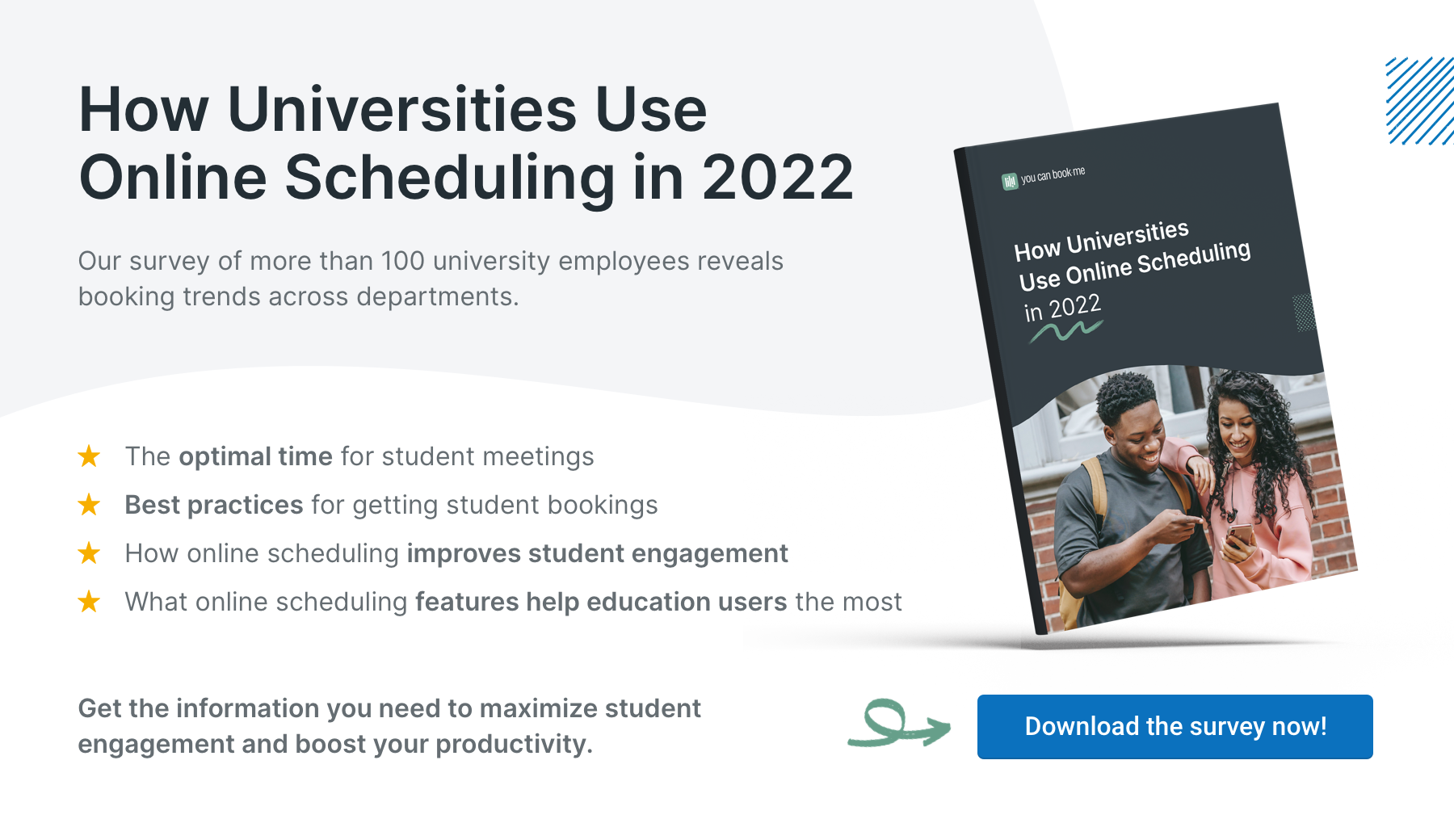How often should you meet with your academic advisor?
Both students and advisors agree that meeting frequently is the best way for students to start, and stay, on the path to success. But what is the best way to facilitate those meetings without adding staff or stress?

Kate Reynier

Academic advisors are like Siri for students. If you’ve got a question, they have an answer - or at least know how to get one.
Part therapist, part cheerleader, part mentor, part critical friend: we should never underestimate the crucial role academic advisors play in ensuring student success.
But students won’t benefit from an advisor's wisdom and professionalism if they don’t meet with them.
It might be tempting to try to go it alone at university, figuring out all the ins and outs of requirements for your major, help with housing, and connections for your career. But a review of dozens of university websites shows that, unsurprisingly, no one recommends that!
So how often should students meet with an academic advisor?
The vast majority of universities recommend meeting your academic advisor at least once a semester. There may be times when you need to speak to them more often than that, but you shouldn’t leave too long between advising sessions.
Why?
The main point that most universities make is that meeting frequently with your academic advisor is a good way to get a sense check on how things are going. And it allows you to address potential issues before they become problems.
What can students discuss when they meet with an academic advisor?
Academic advisors have seen it all. And they have contacts in every area of your institution. They may be able to anticipate a roadblock that you haven’t seen yet. Or they might signpost you to a solution you wouldn’t have discovered by yourself.
And it’s not just academic. Consider your academic advisor as your very own life coach. The more you share about your goals, your interests, conflicts, or other roles you might be juggling, the more they can help make sure you’re on the right track to achieve your dreams.
Meeting more often is better for advisors as well. Student issues stay top of mind, advisors are able to spot trends faster, and ‘early and often’ always beats ‘late and panicked’!
Managing academic advising appointments at scale
Any university that recommends frequent advising appointments needs a way to manage all those meetings.
Very few advisors would dispute that offering walk-in appointments for academic advising can be useful, particularly for last-minute issues.
But it probably wouldn’t surprise you that the vast majority of academic advisors prefer it when students schedule their advising sessions in advance. It allows them to
- prepare for each appointment to ensure they have the advice & information each student needs
- understand their workload better
- sync information from the booking with the student’s record
And in a recent survey, we learned that most students also prefer having advising sessions scheduled in advance. They appreciate
- the efficiency of having a set appointment time, rather than waiting in line.
- knowing the advisor will have enough time for them.
- that the advisor can be better prepared.
But scheduling ahead can bring its own headaches. That's why using an online scheduling tool for education is a no-brainer for any academic advising department.
- There’s no need to staff up just to manage the calls and emails asking for an appointment.
- Availability is clearly displayed and easily changed as needed.
- It’s the most efficient way to find out what the student needs to discuss ahead of time, so you can be prepared.
- It’s available to students 24/7.
- It allows you to offer both in-person and remote meetings.
- It can automatically sync with your student CRM.

University and college students today have unique needs. They are comfortable with technology and expect to be able to use it for a seamless experience. They don’t want to wait until the office opens. They want a personalized experience and to feel that faculty and staff understand them.
Online scheduling empowers students to be in control of their academic advising. They can book any time day or night, choose from different appointment types and lengths based on what they need, and tell the advisor ahead of time what they want to discuss.
Advisors can trigger a series of automated communications - both email and SMS - based on a student’s choices. These notifications can tell students what they need to bring, remind them of the appointment, and send follow-up messages to get feedback or schedule their appointment for next semester. Students can cancel or reschedule at any time without having to call.
And it works for all kinds of university teams.
Online scheduling lets you provide an efficient, personalized academic advising experience for students while saving the team time and helping them be better prepared.
Automating a lot of the tasks associated with scheduling wins back time for advisors to better serve students and boost their success. 
Subscribe to our newsletter
Get productivity tips, news, articles and resources.
Written by
Kate Reynier
Kate is YouCanBookMe's Director of Product. She was YCBM's first employee and feels privileged to have been a part of the journey: from supporting our customers, to helping bring YCBM to life in our blog posts, and now helping to develop a product that our customer love.
Keep reading

7 Must-Have Coaching Software for Client Success
Streamline your business using these top coaching software, taking the admin tasks off your plate so you can focus on helping your clients become the best version of themselves.
Read bloge1f6.jpg)
Schedule Smarter: 7 Doodle Alternatives to Consider in 2024
On a quest to find the best scheduling tool for your team? Check out the seven best Doodle alternatives, all designed to help you save time and hassle!
Read blog
4 Reasons Why YouCanBookMe Is Better Than Calendly
If you're a small business that truly care about your customers, Calendly isn't the right scheduling tool for you. See why YouCanBookMe is better than Calendly on four major fronts.
Read blog



